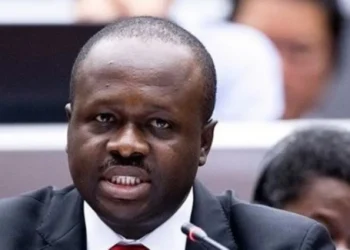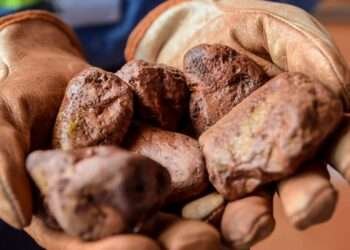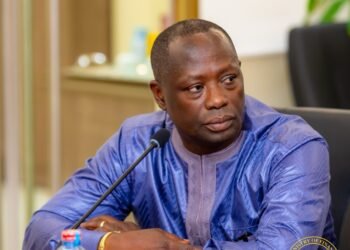Ghana’s Minister for Lands and Natural Resources, Hon. Emmanuel Armah Kofi Buah, has reaffirmed the government’s strong commitment to halting deforestation and restoring the country’s degraded forest cover through a blend of law enforcement, reforestation, and strategic partnerships.
Speaking at the latest session of the Government Accountability Series, the Minister outlined key interventions being implemented under the forestry sector to reverse alarming levels of forest degradation caused by illegal mining, logging, wildfires, and unsustainable agricultural practices.
“One of the greatest challenges in the forestry sub-sector is deforestation and forest degradation. Within our forest reserves alone, over 5,500 hectares—equivalent to about 7,500 football fields—have been degraded.”
Ghana’s Minister for Lands and Natural Resources, Hon. Emmanuel Armah Kofi Buah
He noted that this environmental crisis, which he has consistently highlighted since assuming office, has been largely driven by illegal activities and poor land-use practices.
However, Hon. Armah Kofi Buah reported important progress. He disclosed that, working in collaboration with law enforcement agencies, the Forestry Commission has now successfully repossessed the affected forest areas.

“At the beginning of my service as a minister, I informed the people of Ghana of the crisis we face. But I’m happy to tell you today that we have repossessed all these forests.
“It doesn’t mean we are completely out of the wounds, but it means the forestry guards are now able to enter and exit freely. And when they need reinforcement, they are supported.”
Ghana’s Minister for Lands and Natural Resources, Hon. Emmanuel Armah Kofi Buah
Enforcement Successes
The Minister also detailed recent enforcement successes in curbing the illegal lumber trade. He revealed that 279 trucks transporting illegal lumber were intercepted.
The contents were confiscated and auctioned, with fines imposed on the offenders. This, he noted, forms part of the broader government strategy to promote legal timber trade.
To strengthen this legal framework, Ghana has entered into a Voluntary Partnership Agreement (VPA) with the European Union. The goal of the VPA is to ensure that only legally harvested timber from sustainably managed forests is exported to the EU market.
As part of this arrangement, Ghana is set to issue Forest Law Enforcement, Governance, and Trade (FLEGT) licenses for all timber exports to the EU beginning October 8, 2025.

According to Hon. Armah Kofi Buah, the country is currently finalising the ratification of Timber Utilisation Contracts (TUCs) in Parliament to meet the final requirements of the licensing process.
“This FLEGT licensing is a significant milestone. It assures our international partners that Ghana is serious about forest governance and legal trade.”
Ghana’s Minister for Lands and Natural Resources, Hon. Emmanuel Armah Kofi Buah
Reforestation Drive
Turning to reforestation, Hon. Armah Kofi Buah highlighted the government’s flagship “Tree for Life” Initiative, a large-scale national afforestation program launched by President John Dramani Mahama in March 2025 at Nkawie in the Ashanti Region.
On June 5, the President led a national tree-planting exercise to further demonstrate the administration’s commitment to greening Ghana.
“The Tree for Life Initiative is a major reforestation effort that is very close to President Mahama’s heart. Our target is to plant 30 million trees. As of mid-July 2025, 7.8 million seedlings have been distributed and planted, of which 2.3 million were planted by the private sector.”
Ghana’s Minister for Lands and Natural Resources, Hon. Emmanuel Armah Kofi Buah
He explained that since the nationwide planting began only in June and July, the number of trees planted so far reflects the early stages of the campaign.
With continued efforts by the Forestry Commission and private actors, he expressed confidence that the target will be met by the end of the rainy season in October. Hon. Armah Kofi Buah also spoke of growing efforts to position Ghana’s protected areas as ecotourism hubs.
According to him, the Forestry Commission has received proposals from strategic partners to invest in five identified ecological sites: Digya National Park, Shai Hills Resource Reserve, Kalakpa Resource Reserve, Sakumono Ramsar Site, and Muni-Pomadze Ramsar Site.

These proposals are currently under review as part of plans to develop the sites through public-private partnerships. “The idea is to open up these areas for ecotourism and local economic development,” he said, noting that such ventures will not only create jobs but also incentivise conservation.
The Minister’s address highlighted a comprehensive picture of a government keen to balance enforcement, restoration, and sustainable economic use of Ghana’s forest resources.
He reiterated that the protection of Ghana’s forest cover is not just an environmental necessity but also an economic and national development imperative.



















